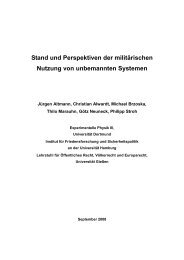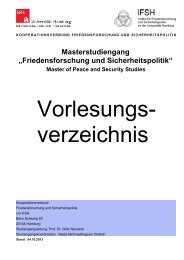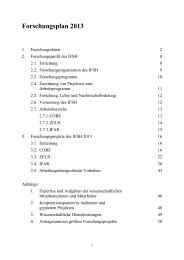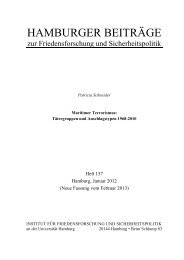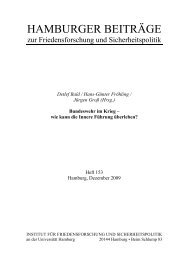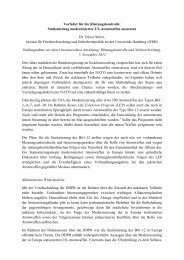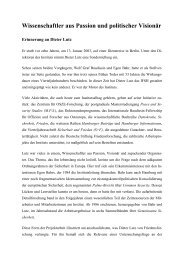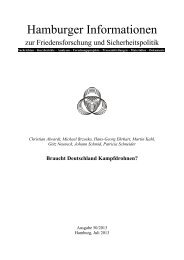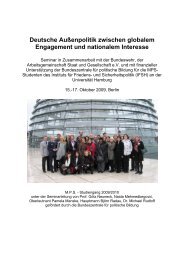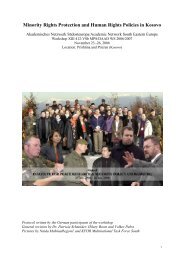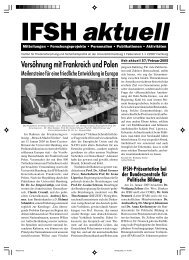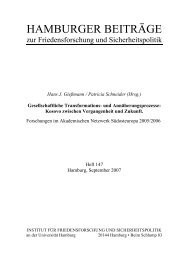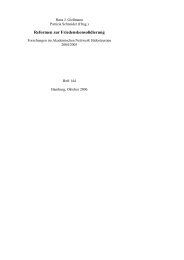New Challenges for the German Security Policy - IFSH
New Challenges for the German Security Policy - IFSH
New Challenges for the German Security Policy - IFSH
Create successful ePaper yourself
Turn your PDF publications into a flip-book with our unique Google optimized e-Paper software.
In <strong>the</strong> following, she presented <strong>the</strong> work of <strong>the</strong> European organs. It is difficult to actually define <strong>the</strong><br />
EU, <strong>for</strong> it is nei<strong>the</strong>r a state nor a loose federation of states. In terms of economics, <strong>the</strong> EU is more<br />
intertwined than <strong>the</strong> United States and Canada; in terms of politics though it is far away from<br />
<strong>for</strong>ming a unity. Never<strong>the</strong>less, no market can survive without political and legal foundations and<br />
thus, <strong>the</strong> EU politics are more and more touching ra<strong>the</strong>r sensitive areas of national politics and<br />
sovereignty. There<strong>for</strong>e, <strong>the</strong> constant balancing between state and EU interests is <strong>the</strong> main conflict<br />
<strong>the</strong> EU institutions have to manage. The European Council is representing <strong>the</strong> interests of <strong>the</strong><br />
member states, whereas <strong>the</strong> European Parliament represents <strong>the</strong> European people. The Commission<br />
takes care of <strong>the</strong> interests of <strong>the</strong> EU. It is not surprising that sometimes all <strong>the</strong> three institutions are<br />
working on <strong>the</strong> same topics – according to <strong>the</strong>ir competences and interests.<br />
Mrs. Trautmann <strong>the</strong>n concentrated on <strong>the</strong> Commissioners: first, <strong>the</strong> EU Parliament needs to approve<br />
<strong>the</strong> Commissions president and <strong>the</strong>n <strong>the</strong> national governments present <strong>the</strong>ir candidate to <strong>the</strong><br />
Parliament. The Parliament can only approve or disapprove <strong>the</strong> Commission as a whole. Although<br />
<strong>the</strong> candidates are selected by <strong>the</strong>ir national governments, it is important to note that <strong>the</strong>y are<br />
expected to act independently – integrity towards <strong>the</strong> EU is considered <strong>the</strong>ir most important asset.<br />
Manipulations of commissioners by <strong>the</strong>ir governments are unlikely <strong>for</strong> <strong>the</strong> system and <strong>the</strong> fear of<br />
bad reputation are widely preventing this. In <strong>the</strong> end, <strong>the</strong> discussion dealt with <strong>the</strong> current<br />
Commission and <strong>the</strong> problems and challenges it is facing.<br />
Speaker: Ms. Daniela Tidten, CFSP and ESDP – <strong>New</strong> Developments<br />
Ms. Tidten introduced <strong>the</strong> topic of Common Foreign and <strong>Security</strong> <strong>Policy</strong> (CFSP) and European<br />
<strong>Security</strong> and Defence <strong>Policy</strong> (ESDP) by talking about different military and civilian crisis<br />
management operations which have been organised under ESDP. Under ESDP, which is a part of<br />
CFSP belonging to <strong>the</strong> EU’s second pillar, <strong>the</strong> European military Committee (EUMC), <strong>the</strong><br />
European Military Staff (EUMS) as well as <strong>the</strong> Committee <strong>for</strong> Civilian aspects of management<br />
(CIVCOM) develop positions which are <strong>the</strong>n <strong>for</strong>warded to <strong>the</strong> Political and <strong>Security</strong> Committee<br />
(PSC). The PSC amongst o<strong>the</strong>rs has <strong>the</strong> political control and strategic leadership of crisis<br />
management operations under <strong>the</strong> responsibility of <strong>the</strong> Council.<br />
Crisis management and conflict prevention are also been worked on in <strong>the</strong> Commission. The “grey<br />
area” of competence between Council and Commission needs to be considered as a problem.<br />
However, <strong>the</strong> Commission, but not <strong>the</strong> Council is supposed to be responsible when EU-law<br />
provides a legal basis <strong>for</strong> Commission action.<br />
The Commission administers <strong>the</strong> budget of CFSP. This increased noticeably in 2006 to 102,3<br />
Million Euros. But compared to <strong>the</strong> Commissions Budget on External Relations of 7 billion Euros<br />
<strong>the</strong> financial budget is relatively small.<br />
The Commission is also active in election observation as a tool of crisis prevention. The recent<br />
observation missions have been sent to Africa and Latin America. The EU moreover cooperates<br />
with o<strong>the</strong>r organisations in this field. They share tasks: e.g. <strong>the</strong>re will not be an observation mission<br />
sent to a country where <strong>the</strong> Organization <strong>for</strong> <strong>Security</strong> and Cooperation in Europe (OSCE) observed<br />
elections.<br />
Since <strong>the</strong> EU is developing military capabilities as part of ESDP <strong>the</strong> question of competition<br />
between EU and NATO is often raised. The EU, with its traditionally strong “soft power” might be<br />
creating unnecessary double structures; especially since <strong>the</strong> Berlin Plus agreement enabled <strong>the</strong> EU<br />
to access NATO capabilities. However, a close cooperation between NATO and EU is also facing<br />
problems: when PSC and NATO Council meet, Malta and Cyprus can not take part, since <strong>the</strong>y are<br />
not NATO members and NATO is strict on its nondisclosure policy.<br />
The <strong>for</strong>thcoming EU-mission to <strong>the</strong> Democratic Republic of Congo might be a practical test <strong>for</strong><br />
ESDP: <strong>the</strong>re have been difficulties with <strong>the</strong> allocation of troops, but it can not be judged whe<strong>the</strong>r or<br />
not this mission will be successful, since <strong>the</strong> date <strong>for</strong> <strong>the</strong> elections is still unknown. The EU looks<br />
after non-member countries to get involved in EU-missions through e.g. providing French speaking<br />
police officers <strong>for</strong> <strong>the</strong> Congo mission.<br />
Although <strong>the</strong> European Constitutional Treaty would have eliminated <strong>the</strong> pillar structure of <strong>the</strong> EU,<br />
11



